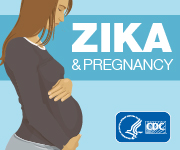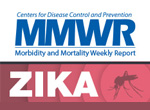COCA Email Updates: October 24 - November 7
If you have any questions on these or other clinical issues, please write to us at coca@cdc.gov
Available for download: November 7, 2016, COCA Email Update
COCA News and Announcements
Upcoming COCA Calls:
NEW:
Advancing the One Health Concept through Collaborations that Connect, Create, and Educate
Date: Thursday, November 17, 2016
Time: 2:00 - 3:00 pm (Eastern Time)
Dial In: 888-857-5738 (U.S. Callers); 415-228-4882 (International Callers)
Passcode: 5266574
Webinar: https://www.mymeetings.com/nc/join.php?i=PW1632051&p=5266574&t=c
Over the past few years, Ebola and Zika have shown the world the importance of One Health – an interdisciplinary approach to health care that brings together humans, animals, and the environment. Ecologists have repeatedly pointed out that human impact on the environment (via deforestation, development, etc.) is bringing people and wildlife into ever increasing contact. Additionally, the world must discover how to feed the projected population of nine billion people without causing further environmental harm. Clinicians in both human and animal health must find ways to communicate despite our siloed systems. This will require conjoined, sustained, and simultaneous attention across many professional arenas. One Health is a path to accomplishing the UN Sustainable Development Goals, from Planetary Health to Global Health Security. During this COCA Call, clinicians will learn about several arenas of One Health, discuss the critical need for and process of connecting the many passionate stakeholders around the world, and share an update on efforts across the U.S. and beyond to make One Health ways of thinking the ‘default way of doing business.
Recent COCA Calls:
Zika in the ED: How Emergency Care Staff can Take Action
Date: Tuesday, November 1, 2016
During this COCA Call, emergency providers learned critical information about Zika, such as how to identify people at risk for infection either through recent travel or through sex with someone infected with Zika, examine the importance of screening protocols, and understand likely symptoms, such as fever, rash, joint pain, and conjunctivitis. Additionally, emergency providers learned key nursing assessment, clinical interventions, and the general process for reporting Zika cases.
What’s New for the 2016-2017 Flu Season: Recommendations for Children
Date: Thursday, October 27, 2016
During this COCA call, subject matter experts from the American Academy of Pediatrics (AAP) and the CDC highlighted this critical information and discussed strategies that primary care providers and medical subspecialists can use to improve flu prevention and control in children.
Archived COCA Conference Calls
Free continuing education credits (CME, CNE, ACPE, CEU, CECH, and AAVSB/RACE) are available for most calls. More information about free CE.
CDC Emergency Response
2016 Zika Virus
Zika Virus Information for Healthcare Providers
UPDATED: Key Messages - Zika Virus
A collection of the most up-to-date and cleared information on the ongoing Zika virus outbreak.
Zika Training for Healthcare Providers
View recorded webinars and on-demand trainings.
Print Resources in Different Languages
CDC fact sheets and posters for distribution to patients are available in languages, including Spanish, Arabic, Tagalog, Vietnamese, Mandarin, Creole, and Korean. These resources cover a variety of topics, including travel information, insect repellent, sexual transmission, and mosquito control.
Clinicians Caring for Pregnant Women and Women of Reproductive Age
UPDATED: Caring for Pregnant Women Living Near the U.S.-Mexico Border
The United States-Mexico border region is unique in that many people move fluidly and regularly (for example, daily, weekly) between the two countries to live, work, attend school, socialize, and seek medical care. Those who live in the border area may not regard movement between border cities or states as “travel.” This context should be considered when asking women about travel history and potential exposure to Zika.
U.S. Zika Pregnancy Registry
CDC and state, tribal, local, and territorial health departments request that healthcare providers, especially obstetric and pediatric healthcare providers, participate in the US Zika Pregnancy Registry.
Clinical Guidance for Healthcare Providers Caring for Pregnant Women
Clinical Guidance for Healthcare Providers Caring for Women of Reproductive Age
Clinicians Caring for Infants and Children
NEW: JAMA Pediatrics Article—Characterizing the Pattern of Anomalies in Congenital Zika Syndrome for Pediatric Clinicians
CDC and other researchers described congenital Zika syndrome, the pattern of birth defects in infants and fetuses associated with Zika virus infection in pregnant women. The identification of a pattern of clinical findings can assist pediatric healthcare providers in providing the most appropriate care for infants and children infected by Zika virus before birth.
Measuring Infant Head Circumference: An Instructional Video for Healthcare Providers in English and Spanish
CDC is working to ensure that infants with microcephaly and other brain abnormalities receive the services they need. Accurately identifying infants with microcephaly is crucial. The goal of this instructional video is to provide clinicians with the tools needed to accurately measure infant head circumference and length.
In English: https://www.youtube.com/watch?v=HWV1JdAhsSo
En Español: https://www.youtube.com/watch?v=tPBxXkIIjt0
Clinical Guidance for Healthcare Providers Caring for Infants & Children
Sexual Transmission
Travel Information
Advice for People Living in or Traveling to South Florida
As of September 19, CDC has updated guidance for the Wynwood-designated area after three mosquito incubation periods passed without any new locally transmitted cases of Zika.
Clinical Evaluation and Testing
Clinical Evaluation & Disease
Zika virus is transmitted to humans primarily through the bite of an infected Aedes species mosquito. The most common symptoms of Zika virus disease are fever, rash, joint pain, and conjunctivitis. Most people infected with Zika virus are asymptomatic. Characteristic clinical findings are acute onset of fever with maculopapular rash, arthralgia, or conjunctivitis. Other commonly reported symptoms include myalgia and headache.
Testing for Zika Virus
Contact your state or local health department to facilitate testing.
State, Local, Tribal and Territorial Health Department Resources
State, Local, Tribal, and Territorial Health Department Resources
Interim CDC Zika Response Plan
The purpose of this document is to describe the CDC response plan for the first locally acquired cases of Zika virus infection in the continental United States and Hawaii.
Zika Community Action Response Toolkit (Z-CART)
The Z-CART outlines an approach to risk communication and community engagement planning and is intended as a template for state, local, and tribal agencies to adapt to their needs and to use for reviewing plans for communicating about Zika during the event of a locally transmitted Zika virus.
CDC News and Announcements
NEW: First Annual One Health Day Highlights Link Between People's Health and Animals, Environment
The first annual global One Health Day was held Thursday, November 3, to raise awareness worldwide about the One Health concept, which recognizes that the health of people is connected to the health of animals and the environment. CDC is among the many organizations participating in the international campaign. CDC launched an updated One Health website and took part in a global hashtag Twitter campaign using #OneHealthDay. CDC’s One Health Office Director and veterinarian Dr. Casey Barton Behravesh also has published a blog about preventing diseases that can spread between people and animals.
CDC Science Clips: Volume 8, Issue: 44
Each week select science clips are shared with the public health community to enhance awareness of emerging scientific knowledge. The focus is applied public health research and prevention science that has the capacity to improve health now.
Public Health Preparedness
Emergency Preparedness and Response - (CDC)
Find preparedness resources for all hazards.
Emergency Preparedness and Response Training Resources for Clinicians – (CDC)
Find online and in-person training resources.
Natural Disasters and Severe Weather
Hurricanes and Other Tropical Storms – (CDC)
Food and Water Needs: Preparing for a Disaster or Emergency – (CDC)
Health and Safety Concerns for All Disasters – (CDC)
Morbidity and Mortality Weekly Report (MMWR)
The MMWR series is CDC’s primary vehicle for scientific publication of timely, reliable, authoritative, accurate, objective, and useful public health information and recommendations. To subscribe electronically, go to. Electronically Subscribe.
October 21, 2016 / Vol. 65/Nos. 43 Download .pdf document of this issue
- Effects of Maternal Age and Age-Specific Preterm Birth Rates on Overall Preterm Birth Rates — United States, 2007 and 2014
- Ocular Syphilis — Eight Jurisdictions, United States, 2014–2015
- Recommendations for Use of Meningococcal Conjugate Vaccines in HIV-Infected Persons — Advisory Committee on Immunization Practices, 2016
- Progress Toward Poliomyelitis Eradication — Afghanistan, January 2015–August 2016
Infectious, Vector-Borne, and Zoonotic Diseases
NEW: First Cases of Candida auris Reported in United States- (CDC)
Thirteen cases of Candida auris (C. auris), a serious and sometimes fatal fungal infection that is emerging globally, have been identified in the United States.
Seasonal Influenza
2015–2016 Flu Season - (CDC)
Influenza Vaccination Information for Health Care Workers - (CDC)
Information for Health Professionals– (CDC)
Weekly Flu View - October 29 – (CDC)
Flu View is a weekly influenza surveillance report prepared by CDC Influenza Division. All data are preliminary and may change as CDC receives more reports.
Planning and Preparedness: Health Professionals and Seasonal Flu – (HHS)
Healthcare providers play an important role during flu season. The following guidance and information will assist healthcare providers and service organizations to plan and respond to seasonal flu.
Travel Safety
Current Travel Warnings
- October 7 (US Department of State)
The U.S. Department of State issues Travel Warnings when long-term, protracted conditions make a country dangerous or unstable. Travel Warnings recommend that Americans avoid or carefully consider the risk of travel to that country. The State Department also issues Travel Warnings when the U.S. Government's ability to assist American citizens is constrained due to the closure of an embassy or consulate, or because of a drawdown of State Department staff.
Food, Drug and Device Safety
NEW: HeartWare Ventricular Assist Device (HVAD) Pumps by HeartWare Inc.: Class I Recall - Loose Connectors May Prevent Alarm from Sounding
HeartWare Inc. is recalling the HVAD controller due to a loose power connector which may cause the rear portion of the pump's driveline connector to become separated from the front portion of the driveline connector. A loose connector may allow moisture to enter the controller causing corrosion, electrical issues, reduced speaker volume and connection failures. If the speaker volume is decreased, the patient may not hear the alarm. If there is a loss of connection, the pump may stop which could cause serious adverse health consequences, including death.
Pharmacists on the Front Lines of Opioid Overdose Prevention
Pharmacists and prescribers share a common goal of ensuring safe and effective treatment for patients. CDC released a new brochure developed specifically for pharmacists that outlines the pharmacist’s role in curbing the opioid epidemic and offers tips on how to engage with patients. The brochure is part of a suite of CDC-published user-friendly resources for patients and providers, related to the CDC Guideline for Prescribing Opioids for Chronic Pain.
MedWatch: The FDA Safety Information and Adverse Event Reporting Program
– (FDA)
MedWatch is your Food and Drug Administration (FDA) gateway for clinically important safety information and reporting serious problems with human medical products.
FoodSafety.gov: Reports of FDA and USDA Food Recalls, Alerts, Reporting, and Resources – (HHS/USDA/FDA/CDC/NIH)
Foodsafety.gov lists notices of recalls and alerts from both FDA and USDA. Visitors to the site can report a problem or make inquiries.
The CDC and HHS logos are the exclusive property of the Department of Health and Human Services and may not be used for any purpose without prior express written permission. Use of trade names and commercial sources is for identification only and does not imply endorsement by the US Department of Health and Human Services.
Links to non-Federal organizations are provided solely as a service to our users. Links do not constitute an endorsement of any organization by CDC or the Federal Government, and none should be inferred. The CDC is not responsible for the content of the individual organizations.
- Page last reviewed: November 9, 2016
- Page last updated: November 9, 2016
- Content source:
- Maintained By:





 ShareCompartir
ShareCompartir